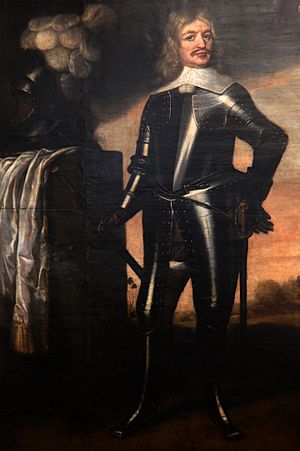Otto Christoph von Sparr facts for kids
Otto Christoph Freiherr von Sparr (born either 1599 or 1605 – died 1668) was a very important military leader, known as a Generalfeldmarschall (Field Marshal), for Brandenburg-Prussia. This was a powerful German state a long time ago. He helped shape its army into a strong force.
Contents
Early Life and Beginnings
Otto Christoph von Sparr came from a noble family in the Margraviate of Brandenburg. He was born in either Lichterfelde near Eberswalde in 1599, or Prenden near Bernau in 1605.
Serving in the Thirty Years' War
Sparr started his military career as an officer for the Holy Roman Empire. This was during the Thirty Years' War, a huge conflict that affected much of Europe. He mostly fought in northwestern Germany. He had a lot of freedom to lead his own troops in a region called Westphalia. During this time, he led a siege against the city of Essen in 1641. He also fought near Stargard. At one point, Sparr was captured near Warendorf.
Joining Brandenburg-Prussia
After the Thirty Years' War ended, Sparr worked for the Electorate of Cologne. In 1649, he led their army against Liège. Later that same year, in December, he joined the service of Frederick William, Elector of Brandenburg. Frederick William was the ruler of Brandenburg-Prussia.
Unifying the Army
Before Sparr joined, the soldiers from different parts of Frederick William's lands were usually led by separate commanders. But in 1651, the Elector gave Sparr command over all the soldiers stationed outside of Brandenburg and the Duchy of Prussia. By 1655, Sparr was given command over all of Brandenburg-Prussia's troops. This was a big step towards creating a single, strong army.
Role in Major Battles
Sparr often acted as Frederick William's main military advisor, like a Chief of Staff, especially when the Elector led the troops himself. A great example of this was during the 1656 Battle of Warsaw. On the last day of this important battle, Sparr, who was then a Generalfeldzeugmeister (Master of Ordnance), led a successful attack by Brandenburg's forces against the Polish army. Because of his great skill and leadership, he was promoted to Field Marshal in 1657.
Later Campaigns and Achievements
Sparr continued to lead troops in many battles.
- In 1658, he fought against the Swedish army.
- The next year, 1659, he successfully captured the fortress of Demmin.
- From 1663 to 1664, he led Brandenburg's soldiers in Hungary against the Ottoman Empire. For his service there, he was given the titles of imperial Field Marshal and Reichsgraf (a count of the Holy Roman Empire).
- His last military action was taking control of Magdeburg in 1666.
Military Innovations
Sparr was a forward-thinking military leader. He strongly believed in the importance of artillery (large cannons) and pioneers (soldiers who build things like bridges and fortifications). He also started to train a special group of officers. This group eventually grew into what we know today as the German General Staff, which plans military strategies.
Death and Legacy
Otto Christoph von Sparr died in Prenden in 1668. His tomb, which was designed by a famous artist named Artus Quellinus, can be found in Berlin's Marienkirche. In 1892, a street in the Berlin suburb of Wedding was named Sparrstraße after him. Later, in 1897, it became Sparrplatz, honoring this important Field Marshal.
See also
 In Spanish: Otto Christoph von Sparr para niños
In Spanish: Otto Christoph von Sparr para niños
 | Madam C. J. Walker |
 | Janet Emerson Bashen |
 | Annie Turnbo Malone |
 | Maggie L. Walker |


